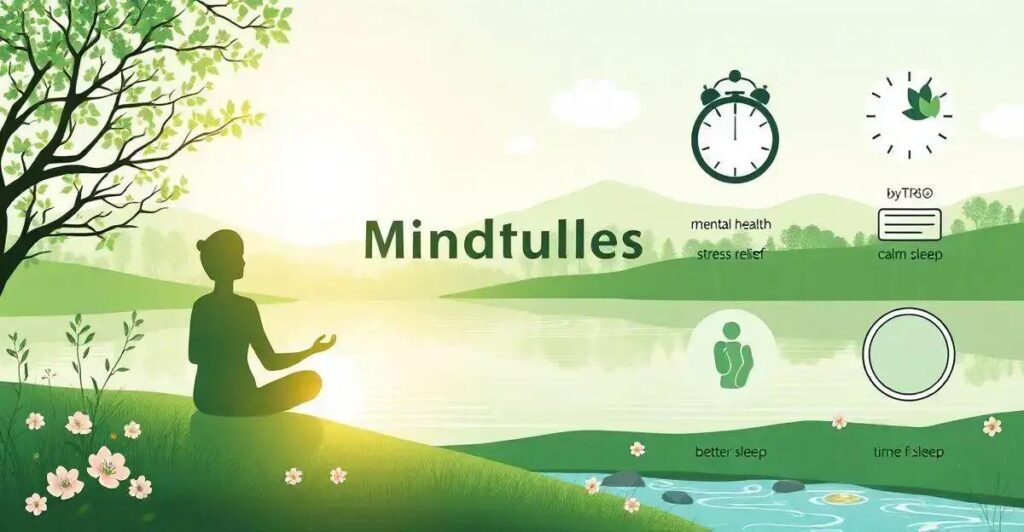In today’s fast-paced world, it’s easy to get caught up in the hustle and bustle and lose sight of what’s truly important.
That’s where mindfulness practices come in – a powerful tool for cultivating a sense of inner peace and reducing stress.
By incorporating mindfulness practices into your daily routine, you can improve your mental health, increase your focus, and even get better sleep.
In this post, we’ll explore the benefits of mindfulness practices and provide you with practical tips and techniques to get started.
The Science Behind Mindfulness Practices
Mindfulness practices are rooted in ancient Eastern spiritual traditions, but their benefits are backed by modern science. Studies have shown that regular mindfulness practice can reduce stress and anxiety, improve sleep quality, and even alter the structure and function of the brain. By increasing the production of gray matter in areas such as the hippocampus and the prefrontal cortex, mindfulness practice can improve emotional regulation, memory, and attention. Additionally, mindfulness practice has been shown to increase the production of neurotransmitters such as serotonin and dopamine, which play a crucial role in mood regulation and motivation.
Benefits of Mindfulness Practices for Mental Health
Mindfulness practices have been extensively researched for their benefits on mental health, and the results are overwhelmingly positive.
Studies have shown that mindfulness practice can reduce symptoms of anxiety and depression, improve mood and overall sense of well-being, and even reduce symptoms of post-traumatic stress disorder (PTSD).
Additionally, mindfulness practice has been shown to increase self-awareness, self-acceptance, and self-compassion, leading to improved relationships and overall mental health.
By incorporating mindfulness practices into your daily routine, you can experience these benefits for yourself and improve your overall mental health.
Mindfulness Practices for Stress Relief
Stress is a natural part of life, but chronic stress can have serious negative effects on both physical and mental health. Mindfulness practices offer a powerful tool for managing stress, by teaching individuals to focus on the present moment and let go of worries about the past or future.
By practicing mindfulness, individuals can develop a greater sense of calm and clarity, and improve their ability to cope with challenging situations.
Additionally, mindfulness practice has been shown to reduce symptoms of anxiety and depression, and even lower blood pressure and cholesterol levels.
With regular mindfulness practice, individuals can learn to manage stress and improve their overall well-being.
Mindfulness Exercises for Improved Focus
Improving focus and concentration is a crucial aspect of everyday life, whether you’re a student, professional, or entrepreneur. Mindfulness exercises offer a powerful tool for improving focus, by teaching individuals to cultivate a greater sense of awareness and attention.
By practicing mindfulness, individuals can improve their ability to prioritize tasks, manage distractions, and stay motivated. Additionally, mindfulness practice has been shown to improve memory and cognitive function, and even reduce symptoms of attention deficit hyperactivity disorder (ADHD).
With regular mindfulness practice, individuals can experience improved focus and concentration, leading to greater productivity and success.
Mindfulness Techniques for Better Sleep
Getting a good night’s sleep is essential for overall health and well-being, but for many people, sleep can be elusive. Mindfulness techniques offer a powerful tool for improving sleep quality, by teaching individuals to cultivate a greater sense of relaxation and calm.
By practicing mindfulness, individuals can reduce symptoms of insomnia and sleep apnea, and even improve their overall mood and energy levels. Additionally, mindfulness practice has been shown to reduce symptoms of chronic pain and fibromyalgia, and even lower blood pressure and cholesterol levels.
With regular mindfulness practice, individuals can experience improved sleep quality, leading to greater overall health and well-being.
Conclusion: Cultivating Mindfulness in Your Daily Life
Cultivating mindfulness in your daily life can have a profound impact on your overall well-being. By incorporating mindfulness practices into your daily routine, you can improve your mental health, reduce stress and anxiety, and even improve your physical health.
With regular mindfulness practice, you can develop a greater sense of self-awareness and self-acceptance, leading to improved relationships and overall well-being.
By making mindfulness a part of your daily life, you can take control of your mental health and well-being, and live a happier, healthier life.
“Mindfulness practices help us stay grounded and aware, making life more manageable.” — (Quora)
FAQ – Frequently Asked Questions about Mindfulness Practices
What are the benefits of mindfulness practices?
Mindfulness practices have been shown to reduce stress and anxiety, improve mood and overall sense of well-being, and even improve physical health.
How can I incorporate mindfulness into my daily routine?
You can start by setting aside a few minutes each day to practice mindfulness, such as meditation or deep breathing exercises.
What are some common mindfulness techniques?
Some common mindfulness techniques include body scan meditation, loving-kindness meditation, and mindful movement.
How can mindfulness help with stress relief?
Mindfulness practice has been shown to reduce symptoms of stress and anxiety, and can help improve overall sense of well-being.
Can mindfulness help with focus and concentration?
Yes, mindfulness practice has been shown to improve focus and concentration by teaching individuals to cultivate a greater sense of awareness and attention.
How can mindfulness help with sleep?
Mindfulness practice has been shown to improve sleep quality by teaching individuals to cultivate a greater sense of relaxation and calm.
Is mindfulness only for mental health?
No, mindfulness practice can have benefits for both mental and physical health, and can be a powerful tool for overall well-being.




Pingback: Top Stress Management Techniques for Better Well-Being 2024
Pingback: 5 Micro-Self-Care Tips Transform Your Day with Simple Habits
Pingback: Empowering Women: Harnessing the Power of Morning Routines for a Successful Day - Empowering Women, One Conversation at a Time.
Pingback: Purple Peel Exploit: 7 Facts About Gut Health and Weight
Pingback: Mindful Eating for Women: 10 Benefits for Body and Soul
Pingback: Self-Care and Female Sexuality: 5 Ways Well-Being Enhances Intimacy